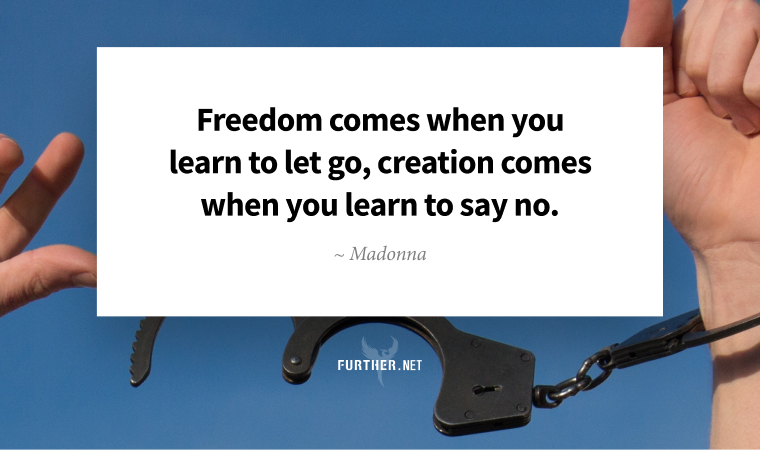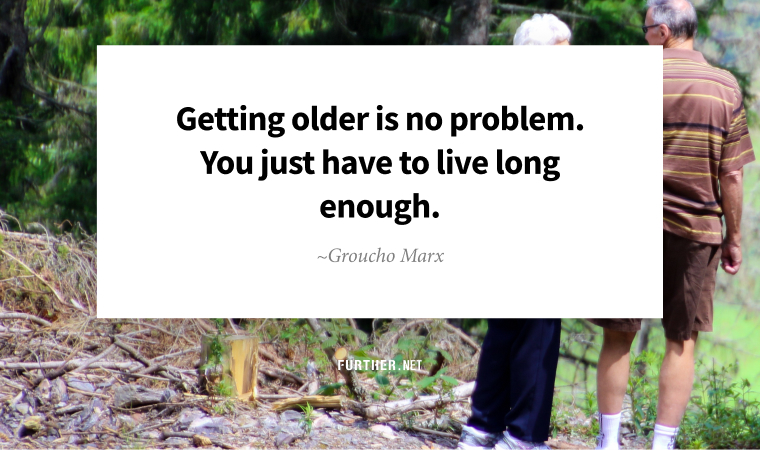
Considering we’re card-carrying members of the “Just Say No” generation, you’d think we’d be easily able to laugh in the face of temptation. And that we could quickly size up a given situation and respectfully decline.
But the truth is saying no isn’t always so simple. In fact, it seldom is. I know I have a bad habit of jumping at things that seem like they’ll be fun or fruitful (or both) and later regret having a lack of foresight and/or boundaries.
So lately, I’ve been working on getting better at saying no. The good news is I’m Brian Clark’s Padawan, and he’s a Jedi master in the art of declining. The bottom line is you’ve got to be cutthroat when eliminating distractions so you can focus on your core commitments.
Confusing movement with results gets us into trouble. When dealing with anyone other than friends or family, saying yes should ultimately lead to results.
As a former attorney, Brian is a big proponent of the Socratic method of dismantling your feeble reasons for saying yes to something you shouldn’t. As a meditation teacher and mindfulness fan, I also appreciate what Shane Parrish culled from a conversation with Daniel Kahneman, the Nobel Prize-winning psychologist and expert on making decisions in the face of uncertainty:
Never say yes on the spot. Always give yourself some space. Make it a rule. Tell people… When he’s on the phone, he says, ‘my rule is I never say yes on the phone. I’ll email you later after I think about it more.’ And when I asked him how often he later says yes, he responded ‘rarely.’
You can imagine that people are conscious of wasting a world-class thought leader’s time, so chances are the offers Kahneman fields are solid. Saying no to a crappy offer is amateur hour; saying no to terrific ones is masterful.
This points to the truth about why it’s so hard to say no: it’s a psychological skill that you have to develop. Think about it: toddlers are terrific at screaming NO at the top of their lungs. But as we grow, our natural ability is tempered by societal expectations, social norms, FOMO, and the general structure of daily life. Inevitably, you should all over yourself, and the next thing you know, you’re cleaning up a yes mess.
So, the first thing you have to do is check in with yourself. Psychology Today advises to ask yourself the following questions when evaluating opportunity costs:
- Do I have time/energy/money for this right now?
- Do I actually want to do this?
- Will this add value to my life?
- Is it aligned with my values?
- Am I saying “yes” simply because I’m afraid to say “no”?
Once you’re clear that an ask or offer is a no-go, it’s time to strategize your response. My biggest trap is being murky and leaving the door open a crack — and I’ll admit, that’s sometimes led to ghosting. You may feel like you can’t afford to say no, but the truth is, you can’t afford to over-commit.
We may fear being disliked or disappointing others … But in the long run, saying no more often can prevent you from inadvertently burning bridges and damaging your personal brand.
By being upfront and honest about your time, boundaries, and commitments, you’ll be able to focus on what’s really important. Plus, you won’t be taking on the angst of dealing with someone who can’t take no for an answer.
Allowing other people to experience and process their feelings without making it your responsibility is a key competency when thinking of saying no to something. It might be helpful to remember that most reasonable people will respond well to an occasional no, and if someone is unreasonable, then it is even more reason to erect firmer boundaries and say no more often.
Yes, turning things down is tough. But living with the consequences of giving away your precious time, energy, and focus is a much bigger no-no.
Further reading:
Keep going-
P.S. New to Further? Join us here.
The Long Game
Dr. Matt Kaeberlein explains his research findings on nutrition as it relates to aging and longevity, including the results from his recent review article in Science. Matt also explains the impact of dietary protein on aging, and talks about low-protein vs. high-protein diets and their effects on muscle mass and mortality.
How Nutrition Impacts Longevity
Anxiously Thriving
Tracy Dennis-Tiwary explains how feeling anxious can give us motivation and insights about ourselves, if we respond to it the right way. “The emotion of anxiety is not broken; it’s how we cope with anxiety that’s broken.”
How We Misunderstand Anxiety and Miss Out on Its Benefits
Value Investing
Personal values play an important role in many aspects of our lives and have become more prominent recently in how we think about and manage our finances. More and more investors are asking how they can support the causes they care about through their financial decision-making.
Creating a Values-Based Financial Plan
Social Unrest
Social media companies are capitalizing on our native need for affirmation, and this frantic hunt for “likes” is making us like ourselves less. There must be another way — a way to unself just enough to remember each other, to grow a little more awake to this world.
The Regal Secret to Longevity

By Trudi Roth
Queen Elizabeth II’s passing is significant for many reasons — not least of all, her impressive longevity. As the Wall Street Journal pointed out, 90% of the world’s population has only ever known her as Britain’s monarch.
While her mum lived to 101, genetics alone doesn’t explain Elizabeth II’s 96-year run. In fact, The Blue Zones author Dan Buettner says genes only dictate 20% of the average person’s life span.
So, what did the Queen do to earn such remarkable longevity? (Hint: It wasn’t just about being the only person who can put on a tiara with one hand while walking down stairs — although that is admirable.)
The Royal Treatment
Privilege and access to excellent healthcare aside (the lack of which are leading causes of America’s plunging life expectancy), the Queen was careful about her consumption. While if I were Queen, I’d partake in orgiastic feasts a la Game of Thrones, Elizabeth II ate to live vs. lived to eat. A typical day included fresh vegetables and fruit (especially home-grown strawberries and peaches), grilled or poached fish or meat, tea, and no starch (potato, rice, pasta).
Elizabeth II also lived a temperate life. Famously anti-smoking, her only indulgences were sweets (especially chocolate) and alcohol (wine and gin cocktails) in moderation. And while she wasn’t a fitness hound, she took her beloved corgis on long daily walks and rode horses as much as possible. Plus, she reportedly got a consistent 8 ½ hours of sleep a night.
If you’re a Blue Zones fan, you’ll recognize life-extending things like moving naturally, eating until you’re 80% full, and enjoying a glass of wine as part of Elizabeth II’s regimen. But it wasn’t just the physical factors that kept her vital; the monarch’s mindset made the difference.
Crowning Achievement
As we often discuss at Further, making meaning of your role in others’ lives is critical to your longevity, and the Queen was an excellent example.
… Her level of effort, a penchant for routine, and a strong sense of purpose, along with setting aside time for play, are thought to have served her well-being well.
When then-Princess Elizabeth was 21 — shortly after she served in the Women’s Auxiliary Territorial Service during World War II — she made a promise to her people:
I declare before you all that my whole life, whether it be long or short, shall be devoted to your service and the service of our great imperial family to which we all belong.
This was her life’s purpose, which kept her evolving, relevant, and popular. It was also how she managed to keep up a 40-hour work week into her 90s. So don’t mourn the Queen; instead, celebrate her life by becoming royally focused on your personal mission.
further: flashback
 38 Special – Hold On Loosely (Live)
38 Special – Hold On Loosely (Live)Wild-Eyed Southern Boys, 1981
Lynyrd Skynyrd’s Ronnie Van Zant introduced younger brother Donnie’s band 38 Special to his manager after the group had paid their dues on the southern rock circuit. Hold On Loosely was the 13th video played on the day MTV debuted, an achievement big brother Ronnie never saw due to a devastating plane crash in Mississippi. (YouTube)
further: sharing

Further subscribers who share the newsletter with friends can gain access to our exclusive membership community Well + Wealthy with only three referrals. Get your own free weekly dose of health, wealth, travel, and happiness advice here, and find out all the details on our referral program.
Thank you for sharing Further!
